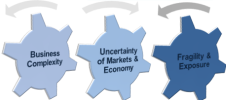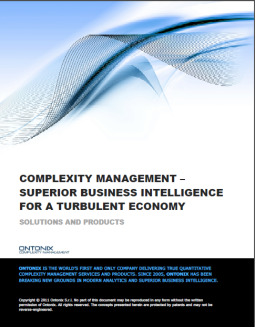Socio-economic lessons from nature: Interdependence NOT overdependence
Friday, 26 February, 2010 Leave a comment
Here is the “full” Nassim Taleb conversation, at The Royal Society with David Cameron – no need to give any extra kudos to the leader of the Conservative Party as a result of his “participation”.
Financial inter-connectedness, or globalisation, has become the economic form of the “planetary eco-system”, or environment. These systems, like the human body, are undeniably complex. It is true of any system that greater complexity equates to more functionality but each has their upper limit around which the “system” becomes unstable, unpredictable and difficult to manage. Beyond the point of “critical complexity” functionality is lost, sometimes rapidly…the system crashes.
It is true of our bodies, the global economy, the environment as it is of a business entity, its eco-system, IT systems, etc.
So, whether we are talking about the our “ personal systems”, or the individual in the context of any of the – interdependent – four pillars of a sustainable society: SOCIAL; CULTURAL; ECONOMIC; ENVIRONMENTAL, each system needs to be robust to be best able to cope with “the unforeseen.” Call it “randomness”, call it “black swan”, call it whatever you like! But “outliers” within data CANNOT be discounted in the manner that they have been by those involved in financial modelling, forecasting, etc. “Conventional wisdom” is no longer enough…
This is not, necessarily, news and elements of the argument are [and will continue to be] disputed…witness the disputed facts re globally warming, etc.
But the age old problem has been:
“HOW DO YOU MANAGE (something so complex) THAT YOU CAN’T MEASURE?”
That is why the QUANTITATIVE COMPLEXITY MANAGEMENT solutions from (link: Ontonix srl) that I will shortly be rolling out in UK, are so exciting. NOW we can confidently state that, with the appropriate data:
“YOU CAN MEASURE, ANALYSE AND MANAGE”
Please take a look at the main website there is no shortage of information. I will post further information including some updated case studies in the coming days but if you would like to discuss any aspect please call me [+44 (0) 7919 917150], leave a comment or email me: david@ontonix.com
Without Ontonix:













